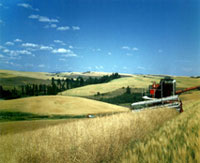 |
Bioenergy is renewable energy made available from materials derived from biological sources. In its most narrow sense it is a synonym to biofuel, which is fuel derived from biological sources. In its broader sense it includes biomass, the biological material used as a biofuel, as well as the social, economic, scientific and technical fields associated with using biological sources for energy. This is a common misconception, as bioenergy is the energy extracted from the biomass, as the biomass is the fuel and the bioenergy is the energy contained in the fuel.
At the end of 2009, worldwide nameplate capacity of wind-powered generators was 159.2 gigawatts (GW).[1] Energy production was 340 TWh, which is about 2% of worldwide electricity usage;[1][2] and has doubled in the past three years. Several countries have achieved relatively high levels of wind power penetration (with large governmental subsidies), such as 20% of stationary electricity production in Denmark, 14% in Ireland[3] and Portugal, 11% in Spain, and 8% in Germany in 2009.[4] As of May 2009, 80 countries around the world are using wind power on a commercial basis. |


